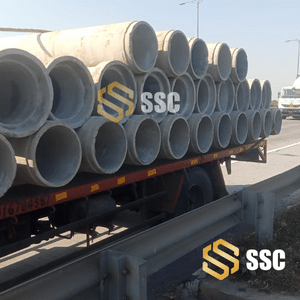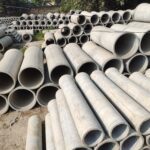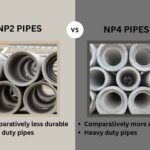WHAT ARE RCC PIPES?
RCC Hume pipes are reinforced concrete pipes that are commonly used in the construction of underground water and sewage systems, culverts, and drainage systems.
RCC pipes are made either by vertical vibration process or by the spun process as per IS 458:2021.
Cement pipes have several advantages over other types of pipes.
They are strong and durable and can withstand heavy loads, making them ideal for use in underground applications.
They are also resistant to corrosion, which is important for water and sewage systems that are constantly exposed to moisture.
Additionally, they are relatively easy to install and maintain.
Hume pipes come in a variety of sizes, ranging from a few inches to several feet in diameter. The choice of size depends on the specific application and the amount of water or sewage that needs to be transported.
Smaller pipes are used for residential applications, while larger pipes are used for commercial and industrial applications.
Overall, Concrete pipes are a reliable and cost-effective choice for underground water and sewage systems, culverts, and drainage systems. Nowadays, Hume pipes are also used in telecom industries for cable laying.
Where are RCC pipes used?
Concrete pipes are commonly used in a variety of underground applications such as:
-
- Sewerage Systems: Cement pipes are commonly used for sewerage systems in residential, commercial, and industrial areas. These pipes are highly durable, corrosion-resistant, and can withstand the pressure and flow of wastewater, making them a reliable choice for sewerage systems.
-
- Drainage Systems: Spun pipes are also used for drainage systems in areas prone to heavy rainfall or flooding. These pipes are designed to handle large volumes of water and can withstand the pressure of flowing water, making them ideal for drainage systems.
-
- Culverts: Concrete pipes are often used for culverts, which are structures used to allow water to pass underneath a roadway, railway, or other transportation structures. RCC pipes come in a wide variety of sizes making them a versatile option for culverts.
-
- Irrigation Systems: RCC pipes are commonly used for irrigation systems in agriculture, horticulture, and landscaping. These pipes are highly durable and can withstand the pressure of water flow, making them ideal for irrigation systems.
-
- Water Supply Systems: Spun pipes are also used for water supply systems in residential, commercial, and industrial areas. These pipes are highly durable and can withstand high water pressure, making them a reliable choice for water supply systems.
RCC drainage pipes are preferred in these applications due to their strength, durability, and resistance to corrosion. They are also relatively easy to install and maintain, making them a cost-effective solution for various construction projects.
What is the Full form of RCC pipe?
The Full form of the RCC pipe is “Reinforced Cement Concrete (RCC) Pipe”.
The term “reinforced” refers to the use of steel reinforcement in the concrete mixture to provide additional strength and durability to the pipe.
The term “cement concrete” refers to the type of concrete used in the pipe, which is made from a mixture of cement, water, and aggregates such as sand and gravel.
RCC pipes are commonly used in the construction of underground water and sewer systems, culverts, and drainage systems.
What is RCC Hume pipe length?
RCC (Reinforced Cement Concrete) pipes are available in different lengths, diameters, and classes. The length of RCC pipe can vary depending on its diameter and intended use.
Typically, the length of RCC pipe ranges from 2 meters (6.56 feet) for smaller-diameter concrete pipes to 2.5 meters (8.2 feet) for larger-diameter pipes.
For diameters 150MM to 300 MM Inner Dia NP2, NP3, and NP4 classes the pipes are available in 2-meter lengths.
For diameters 300MM to 2200MM Inner Dia NP2, NP3, and NP4 classes the pipe is available in 2.5 Meter Lengths.
What are the price of the RCC pipes?
The price of RCC (Reinforced Cement Concrete) pipes can vary depending on several factors such as the diameter, length, class, and market demand in a particular region. Other factors that can affect the price include the cost of raw materials, transportation costs, the manufacturing process, and taxes.
Typically, the price of smaller diameter RCC pipe (such as those used for drainage or irrigation) can range from Rs. 250 to Rs. 500 per meter, while larger diameter pipes (such as those used for water supply or sewage) can cost between Rs 700 to 20,000 per meter. However, these are only rough estimates and the actual price can vary significantly depending on the aforementioned factors.
It is important to note that the price of Hume spun pipes can also vary depending on the supplier or manufacturer. Therefore, it is recommended to obtain multiple quotes from different suppliers to get a better understanding of the prevailing market price.
Check out the complete RCC Hume pipes price list.
What is the diameter of RCC pipe?
The diameter of RCC (Reinforced Cement Concrete) pipe can vary depending on the intended use and the requirements of the project. The diameter of the pipe determines the volume of fluid or gas that can be transported through it, and it is an important factor in the selection of the pipe.
RCC pipes are available in a range of diameters, typically ranging from 150 mm (6 inches) to 2200 mm (88 inches) or more. Diameters available in Various classes of non pressure Hume pipes:
-
- NP2 Class RCC Hume Pipes: 150 mm (6 inches) to 1000 mm (40 inches)
-
- NP3 Class RCC Hume Pipes: 150 mm (6 inches) to 2200 mm (88 inches)
-
- NP4 Class RCC Hume Pipes: 150 mm (6 inches) to 2200 mm (88 inches)
It is important to note that the selection of the diameter of the RCC pipe depends on the requirements of the project, the flow rate of the fluid, and the terrain over which the pipe will be installed. It is recommended to consult with a qualified engineer to determine the appropriate diameter of the pipe for a given project.
What are the types of RCC pipes?
There are mainly three types of RCC (Reinforced Cement Concrete) pipes, which are NP2, NP3, and NP4 Hume pipes are classified on the basis of load-bearing capacity and durability:
-
- NP2 RCC Pipes: NP2 RCC pipes are Reinforced concrete Light duty Non Pressure pipes that are Suitable for drainage and irrigation use, for cross drains/ culverts carrying light traffic. Check out the complete RCC NP2 Pipe Specification.
-
- NP3 RCC Pipes: NP3 RCC pipes are Reinforced concrete Medium duty Non Pressure pipes that are Suitable for drainage and irrigation use, for cross drains/ culverts carrying medium traffic.
- Check out the complete RCC NP3 Pipe Specification.
-
- NP4 RCC Pipes: NP4 RCC pipes are Reinforced concrete Heavy duty Non-Pressure pipes that are Suitable for drainage and irrigation use, for cross drains/ culverts carrying Heavy traffic.
- Check out the complete RCC NP4 Pipe Specification.
Generally, NP2, NP3, and NP4 cement Pipes differ on the basis of barrel wall thickness and the amount of reinforcing steel present inside the pipes. Check out the difference between NP3 hume pipe and NP4 Hume Pipe.
Specifications of RCC Hume pipe
The specifications of hume pipes depend on the following parameters:
-
- Diameter: Spun pipes are available in different diameters, ranging from 150mm to 3000mm or more, depending on the application.
-
- Wall thickness: The wall thickness of Concrete pipes varies according to the diameter and type of pipe. Generally, the wall thickness ranges from 25mm to 185mm.
-
- Length: Cement pipes are usually manufactured in standard lengths of 2 meters or 2.5 meters.
-
- Pipe Weight: Hume pipe weights depending on size can vary from 80 kg to 10 tons.
Check complete specifications of spun pipes including RCC pipe weight and wall thickness.
For More Info Please contact us on:
Mail Us: shubhsanskarconcrete@gmail.com
Call Us: +91 99990 62399, +91 9810756705
Visit Our Website on: www.shubhsanskarconcrete.com
Follow on Facebook: https://www.facebook.com/shubhsanskarconcrete
Follow On Instagram: https://www.instagram.com/shubhsanskarconcrete/
Follow On twitter: https://twitter.com/shubhsanskarc
Follow On LinkedIn: https://www.linkedin.com/company/shubhsanskarconcrete/



